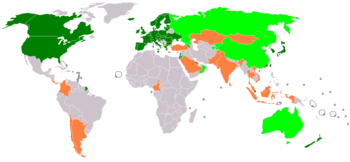Agreement on Government Procurement
The Agreement on Government Procurement (GPA) is a plurilateral agreement under the auspices of the World Trade Organization (WTO) which regulates the procurement of goods and services by the public authorities of the parties to the agreement, based on the principles of openness, transparency and non-discrimination.
 Parties to the Marrakesh agreement, as amended:
Parties Observers negotiating accession Observers only | |
| Signed | 12-04-1979 (Geneva) 02-02-1987 (amendment) 15-04-1994 (Marrakesh) 30-03-2012 (amendment) |
|---|---|
| Location | Geneva (1979), Marrakesh (1996) |
| Effective | 01-01-1981(Geneva) 14-02-1988 (amendment) 01-01-1996 (Marrakesh) 06-04-2014 (amendment) |
| Parties | 12 (Geneva, as amended) 19 (Marrakesh, as amended) |
| Depositary | Director-General of the World Trade Organization |
| Languages | English, French and Spanish |
The agreement was originally established in 1979 as the Tokyo Round Code on Government Procurement,[1] which entered into force in 1981 under the auspices of the General Agreement on Tariffs and Trade.[2] It was then renegotiated in parallel with the Uruguay Round in 1994, and this version entered into force on 1 January 1996. The agreement was subsequently revised on 30 March 2012. The revised GPA came into effect on 6 July 2014.[2]
Parties
The following WTO Members are parties to the 1994 agreement:[3]
| Parties | Accession date |
|---|---|
| Canada | 1 January 1996 |
| The European Union with respect to Austria, Belgium, Denmark, Finland, France, Germany, Greece, Ireland, Italy, Luxemburg, the Netherlands, Portugal, Spain, Sweden and the United Kingdom | 1 January 1996 |
| Israel | 1 January 1996 |
| Japan | 1 January 1996 |
| Norway | 1 January 1996 |
| Switzerland | 1 January 1996 |
| United States | 1 January 1996 |
| The Netherlands with respect to Aruba | 25 October 1996 |
| South Korea | 1 January 1997 |
| Hong Kong SAR | 19 June 1997 |
| Liechtenstein | 18 September 1997 |
| Singapore | 20 October 1997 |
| Iceland | 28 April 2001 |
| The European Union with respect to Cyprus, the Czech Republic, Estonia, Hungary, Latvia, Lithuania, Malta, Poland, the Slovak Republic and Slovenia | 1 May 2004 |
| The European Union with respect to Bulgaria and Romania | 1 January 2007 |
| Chinese Taipei | 15 July 2009 |
| Armenia | 15 September 2011 |
| The European Union with respect to Croatia | 1 July 2013 |
| Montenegro | 15 July 2015 |
| New Zealand | 12 August 2015 |
| Ukraine | 18 May 2016 |
| Moldova | 14 June 2016 |
| Australia | 5 May 2019 |
The following WTO Members have obtained observer status with respect to the GPA, with those marked with an asterisk (*) negotiating accession: Albania*, Argentina, Bahrain, Brazil*[4], Cameroon, Chile, China*, Colombia, Costa Rica, Georgia*, India, Indonesia, Jordan*, Kyrgyz Republic*, North Macedonia, Malaysia, Mongolia, Oman*, Pakistan, Panama, Russian Federation, Saudi Arabia, Seychelles, Sri Lanka, Tajikistan*, Thailand, Turkey and Vietnam.[3]
Review Body on Bid Challenges
The Review Body on Bid Challenges is a body set up by party states in order to allow suppliers to challenge irregular government tenders.[5] Such bodies are independent and endeavors to process each case in an expeditious manner. The Review Body is also empowered to recommend Rapid Interim Measures which can be recommended within days where a Review Body finds a prima facie case for a bid challenge.[6]
Prospective UK membership
In 2016, several commentators suggested that following the United Kingdom's departure from the European Union (EU), the UK would need to renegotiate to become a party to the GPA in its own right, as the UK's membership currently arises by virtue of its being a member of the EU.[7]
In October 2018, Bloomberg reported that some WTO members, including Moldova, may block the UK's post-Brexit membership of the GPA or request concessions.[8] At the same time the United States and New Zealand also raised concerns about the UK's membership proposal "because its application was missing key information".[9] On 27 February 2019, the WTO's GPA Committee made a decision on the UK’s accession, such that if the UK leaves the EU with no deal in place, the UK will ratify the GPA in its own name as soon as possible, and if there is a deal with the EU which provides for a transitional period of continued application of membership arrangements, UK membership within the context of the EU's membership would continue, and a further decision of the GPA Committee would be required to allow for UK accession at the end of the transitional period.[10] Ratification is subject to parliamentary approval under section 20 of the Constitutional Reform and Governance Act 2010.
References
- Agreement on Government Procurement, 12 April 1979, accessed 1 July 2019
- World Trade Organization, Agreement on Government Procurement, accessed 1 July 2019
- "Parties and observers to the GPA". WTO. Retrieved 9 June 2016.
- https://www.wto.org/english/news_e/news20_e/gpro_19may20_e.htm
- "WTO GPA- Support Behind Suppliers' Back in Government Tender Disputes | Hong Kong Lawyer". www.hk-lawyer.org. Retrieved 11 March 2020.
- "WTO GPA- Support Behind Suppliers' Back in Government Tender Disputes | Hong Kong Lawyer". www.hk-lawyer.org. Retrieved 11 March 2020.
- e.g. Cameron, A., Brexit: What does it mean for public procurement?, 8 July 2016, accessed 11 September 2016
- Baschuk, B., Moldova Grudge Could Cost U.K. Access to $1.7 Trillion Projects, published 17 October 2018, accessed 28 June 2019
- Baschuk, B., U.S. Stalls U.K. Bid to Stay in $1.7 Trillion Market, published 17 October 2018, accessed 28 June 2019
- Fox, L., The UK’s accession to the Agreement on Government Procurement (GPA), written statement to the House of Commons, 28 February 2019, accessed 28 June 2019
External links
- The plurilateral Agreement on Government Procurement (GPA) (WTO)
- integrated Government Procurement Market Access Information Portal (e-GPA), a single point of access to market access information, provided by the WTO